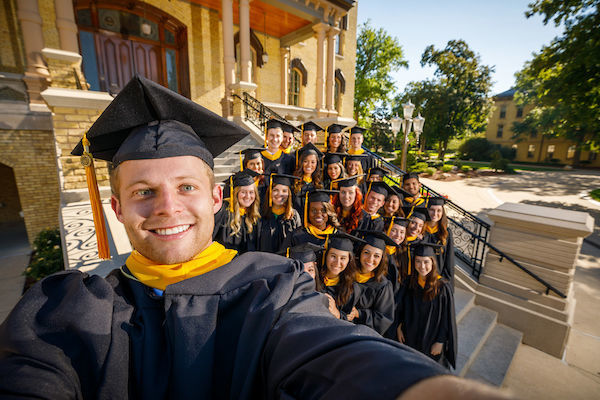The University of Notre Dame’s Master of Science in Global Health program held its sixth commencement exercise on Saturday, July 29, 2017. A diverse cohort of students celebrated the completion of the requirements for the professional degree of Master of Science in Global Health.
The year-long program culminated with a capstone project. Students fulfilled this research requirement in 12 different countries including: Belize, Haiti, India, Kenya, Peru, Thailand, Uganda, Viet Nam, Ecuador, Ethiopia, Zambia and the United States.
The weekend festivities started off with a Global Health Science Fair held Friday, July 28, 2017. Students had the opportunity to showcase their research projects either through a poster or presentation.

Commencement activities were held in Washington Hall at the University of Notre Dame. N. Regina Rabinovich, MD, MPH, ExxonMobil Malaria Scholar in Residence at Harvard University, presented the commencement address. In addition to the keynote speaker, class representative, Chris Knaub put together a video of the graduates’ research projects and activities throughout the year.
Graduates are now pursing a variety of opportunities. While some are furthering their education at medical and law schools like Yale, Creighton, New York Medical College, St. Louis University, and Notre Dame, or continuing into a doctoral program, other students are entering the global health workforce with the Peace Corps and state public health departments. “We believe no matter where our graduates end up they will carry with them the principle that everyone has a right to quality and affordable health care,” notes Katherine Taylor, PhD, Director of Global Health Training at Notre Dame’s Eck Institute for Global Health.
Notre Dame’s Master of Science in Global Health program is 12-month, science-centric academic program that arms students with the knowledge, tools, and experience to be part of the solution to the global health crisis. The rigorous curriculum includes classroom training and experiential learning to prepare students for improving human health around the world, especially in poor and underserved people.
After two semesters of coursework on campus, students complete a six- to eight-week field experience abroad in a resource-poor location. Upon their return from their international immersion, each student submits and presents a capstone project. This scholarly report includes original or literature based research written by which they connect classroom science-centric training, survey research, and mathematical modeling to the field via hands-on experience.
The Eck Institute for Global Health is a university-wide enterprise that recognizes health as a fundamental human right and endeavours to promote research, training, service to advance health standards for all people, especially people in low and middle-income countries, which are disproportionately impacted by preventable diseases. For more information about Notre Dame’s Master of Science in Global Health degree program, visit: here